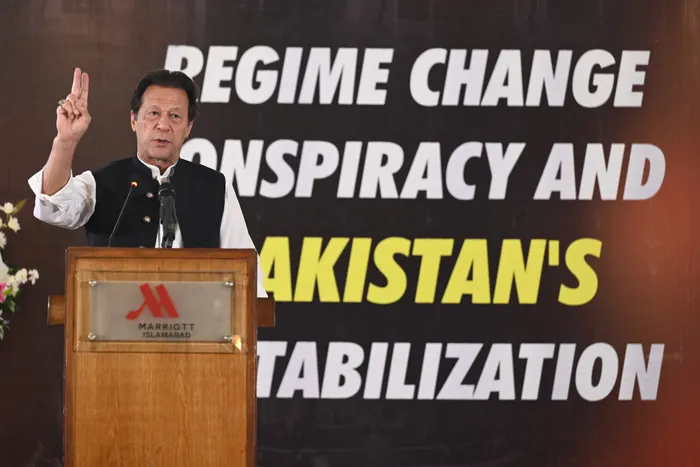World news weekly round-up

Picture: Aamir Qureshi/AFP - Pakistan's ousted prime minister Imran Khan was charged under anti-terror laws after he criticised the police and a judicial officer during a rally.
By Shifaan Ryklief
This past week, in news from around the world, Ukraine marked its independence from Soviet rule in 1991, Pakistan police charged former prime minister Imran Khan, and the Taliban said it was seeking an exchange agreement for Russian crude oil products.
Business Insider reported that the Taliban’s Minister of Industry and Trade Nuriddin Azizi was in Moscow last week and told the Russian state-owned news agency RIA Novosti that they are willing to pay for the Russian goods with money instead of an exchange deal for their minerals, which cannot be agreed on.
“We can supply hundreds of tons of such products to Russia. For example, prices for medicinal herbs are now very high, and Russia needs such raw materials for medicine,” he said.
According to Sputnik News, there are no restrictions on Afghanistan from the US or the EU on such supplies of raw materials, and Kabul wants to reach an agreement with Moscow by the end of the year to buy some one million tons of gasoline and one million tons of diesel.
“Our priority is to import Russian goods under a barter scheme,” said Azizi. “If operations under this scheme do not work out, then we can use financial transactions.”
Meanwhile, Russia’s neighbour, Ukraine, celebrated its Independence Day from Soviet rule in 1991 on Wednesday, which also marked six months since the start of Russia’s “special military operation”.
Ukraine’s President Volodymyr Zelensky said during a video message on Tuesday that it was an important day for all and thanked “everyone who helped Ukraine”.
“We have planned many activities, something that will emphasise the path we have covered,” said Zelensky.
“Ukrainians in Ukraine, throughout our territory, are free and temporarily occupied because our people are fighting everywhere,” he said.
And, in the midst of the Russia-Ukraine conflict, the US and South Korea began their largest military drills in years in a bid to tighten their readiness over North Korean tensions. The joint military drills involve warships, tanks, aircraft and potentially tens of thousands of troops.
According to Al Jazeera news agency, the annual summertime exercises in Korea, renamed Ulchi Freedom Shield, began on Monday and are scheduled to end on September 1.
South Korean President Yoon Suk-yeol, who took office in May, said the exercises are aimed at improving the nation’s readiness to match the changing patterns of war with the evolution of cyber threats and promised to “normalise” the combined exercises to boost deterrence against North Korea.
“Maintaining peace on the Korean peninsula is built on our airtight security posture,” Yoon said during a cabinet meeting.
In Pakistan, political tension heated up when Pakistan police charged former prime Minister Imran Khan following a public rally. The former cricket star was charged under anti-terror laws after he criticised the police and a judicial officer during a rally in the capital city, Islamabad, with his speeches said to be “spreading hate speech” and causing political tensions in the country.
Khan has been holding a number of mass rallies around the country in his bid to return to office since he was ousted earlier this year after losing a no-confidence vote in his leadership.
“On May 25 when police perpetrated violence against us, I was told by insiders that police acted under orders by above, which means they were under pressure by the neutrals to thrash PTI (Pakistan Tehreek-e-Insaf) workers,” Khan said during his speech at the weekend.
“Are the neutrals really neutral?” he asked.
In Malaysia, ex-prime minister Najib Razak has failed to overturn the verdict in the scandalous corruption case linked to the 1Malaysia Development Berhad (1MDB) national investment fund and has been sent to prison for 12 years.
In 2020, a Malaysian court sentenced the 69-year-old Najib to 12 years in prison and a $46-million fine for illegally receiving about $10m from the 1MDB subsidiary unit.
Lastly, China’s rivers are drying up as it suffers its worst drought on record as soaring temperatures dry up key parts of the Yangtze River.
The drought, which started in June, had affected more than 5.7 million people in central China’s Hubei Province as of Friday, according to the provincial emergency management department, citing a Xinhua news report.
The dire conditions are damaging crops and limiting drinking water supplies in some central and southern communities. At the same time, major manufacturers in Sichuan Province said they had been hit by power cuts due to the severe drought amid a record-breaking heatwave.
Ryklief is a multimedia journalist at African News Agency (ANA)
Twitter: @FootballFaan
This article is original to the The African. To republish, see terms and conditions.